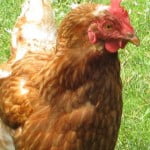Sanctuary Life
Alice the hen makes new friends
Hens like company and Alice was lonely so her owner asked if she could join our hens at the sanctuary. Yes, that’s fine, but would Alice, who was used to being by herself, fit in with the hens, cockerel and a turkey?Alice is a Warren hen, which is a man-made cross between a Rhode Island Red and a Light Sussex. These hens are a commercial breed, you get the heavy build of the R.I.R. and the good laying characteristics of the Light Sussex. It’s one of the most usual crosses to be found in the poultry world and sadly, is the one most destined for the intensively reared commercial operation.
The Rhode Island Red has rich red feathers and is a large bird. The Light Sussex is a pure white with a row of black flecked feathers round her neck. She is smaller and lively, much taken to ‘laying away’ and then coming home with a brood of a dozen little chicks behind her (if she survives the fox that is).
We didn’t put Alice with the other hens straight away but gave her a couple of days to settle and get used to us. It’s also a chance to check for any signs of illness. If hens come from a market or commercial poultry farm they need to be quarantined for at least three weeks.
Alice was fine though and very tame, she had obviously been well cared for. What would she think to her new friends though? The words ‘pecking order’ derive from the poultry hierarchy and chickens are very determined on their status. Who gets to eat first? Who has the best place on the perch? Who goes in first – and comes out in front in the morning? Who sits next to the cockerel? Aaah! He’s the boss and there’s some competition to be his favourite!
Hens can seem to be quite hard in their social ways – until the pecking order is established that is. We knew that Alice would be right down there at the bottom to begin with. Would she fight back? Or accept a subordinate position? It all depended on what they thought of her and whether she would boss them back. Squabbles in the hen house are to be avoided at all costs.
It’s rarely possible to put a new hen out in the run with the others straight away. They’ll bully her and she will try to escape and may fly out, it’s doubtful that she would venture into a new hen house without a proper invitation. The best way to get everyone acclimatised is to introduce the newcomer at night, when everyone is sleepy and roosting. Hens, like most birds, go into slumber mode as soon as it gets dark and then they don’t want to move.
If they haven’t made it into the safety of their inside perch they will be an easy target for predators. If their wings haven’t been clipped and they are able to fly they will head for the tallest tree they can find and roost in the branches. Great, they’ll be safe from Mr.Fox then. No, actually not. Hens are early risers and learn ‘the early bird catches the worm’ at their mother’s wing. Up they get as soon as dawn breaks and straight into the jaws of Reynard who likes a last food patrol before he heads to his den to sleep for the day. We don’t let our hens out till after breakfast, theirs as well as ours.
We put a sleepy Alice onto a perch as soon as it was dark. There was a bit of clucking and fussing from the neighbours but after a few minutes they were all quiet again. When you’ve introduced a new hen it’s a good idea to check on them first thing and a big bowl of breakfast is a good distraction. Alice was in a corner by herself while the rest of the gang tucked in to their split maize, baked potato and left over scraps. Noel, our turkey, eats separately, he has a large appetite. Another dish for Alice and they were all settled. We put an extra water can in too as there can be squabbles over drinking arrangements. The more facilities the better when introducing a newcomer.
We kept the chickens in for four days, until we were sure they were all friends and Alice had found her place. A wire netting frame over the door during the daytime let them all see out and helped with the adjustment. It’s a big world out there, especially in a new hen run. Putting straw on the floor gives the hens something to do, they like to scratch and it stops them being bored. Throwing a pile of grass and weeds in too is a good idea.
At last we felt confident enough to let them all out. Would Alice stay with her new friends? No problem at all, she is polite and defers and they are accustomed to her now and let her share their routine. The cockerel finds worms for Alice so she must be on the favoured friend list. Would she go in the hen hut when it was dusk? This is the real test, hens are nervous creatures and venturing through that pop-hole can be frightening. We watched from a distance. They all went in except for Alice. She looked round for the other hens, stepped on to the ramp, peered inside, hesitated….. and then went straight in. It took a few days of adjustment but Alice is fine now and happy with her new friends.

